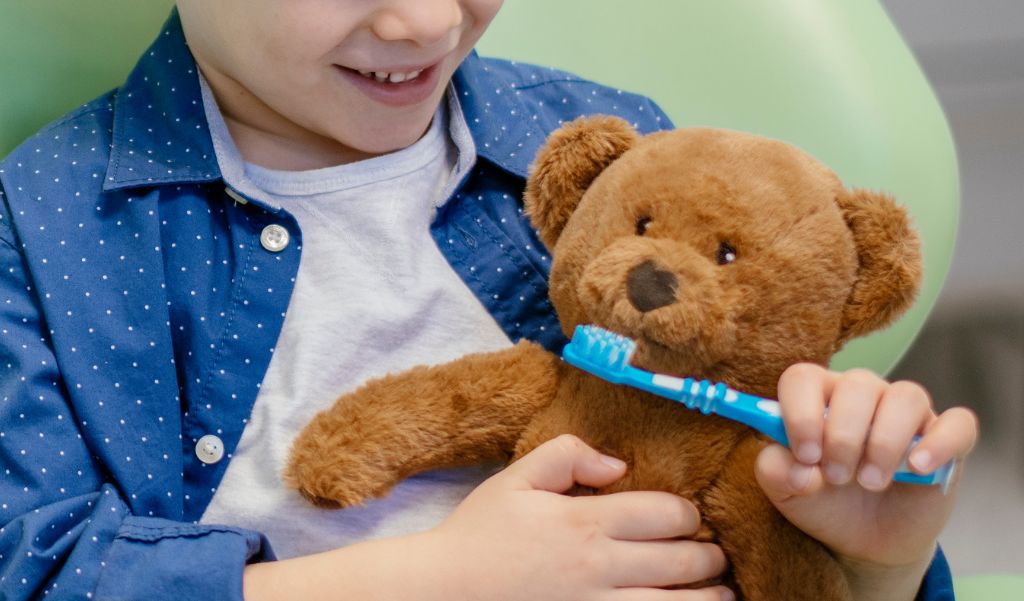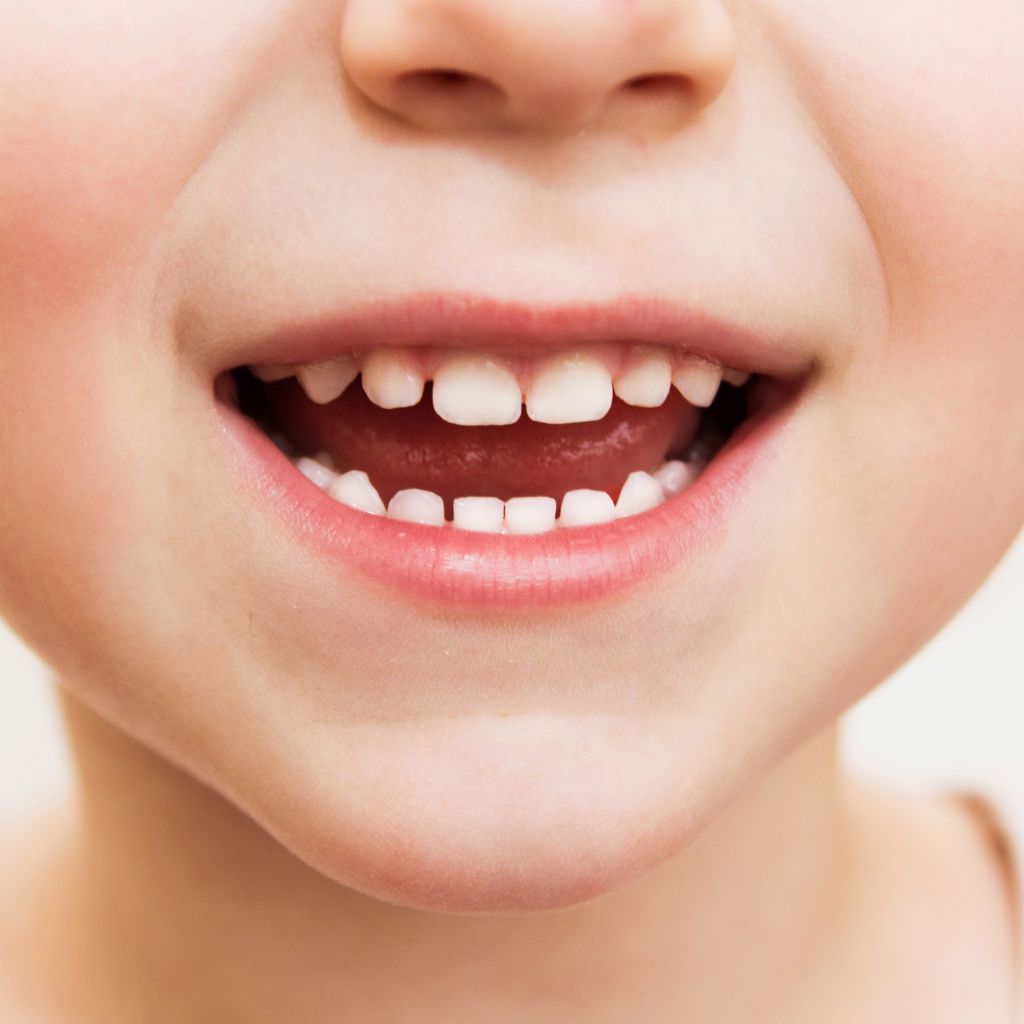Pediatric dentistry is the area of dentistry that deals with the oral health of babies, children and adolescents. Its aim is to focus on prevention in order to avoid complications both in the short and long term when the child reaches adulthood. At a pediatric dentistry appointment, an early oral examination can be carried out, through which important advice can be given on hygiene care and preventive treatments to consider. In addition, fluoride is applied to remineralize the enamel, which in turn helps prevent the appearance of cavities. At these appointments, fissure sealants can also be applied, i.e. the placement of resin in the grooves and fissures of the molar faces to prevent the accumulation of bacteria and food debris. When this accumulation already exists, it is also up to the pediatric dentist to eliminate the infectious foci. There are also preventive treatments, which should be carried out in collaboration with the orthodontist and/or speech therapist, in order to prevent, correct or minimize problems such as poor dental positions, occlusion and/or skeletal changes and certain parafunctions in the child. At a pediatric dentistry appointment, an early oral examination can be carried out, through which important advice can be given on hygiene care and preventive treatments to consider. In addition, fluoride is applied to remineralize the enamel, which in turn helps prevent the appearance of cavities. At these appointments, fissure sealants can also be applied, i.e. the placement of resin in the grooves and fissures of the molar faces to prevent the accumulation of bacteria and food debris. When this accumulation already exists, it is also up to the pediatric dentist to eliminate the infectious foci. There are also preventive treatments, which should be carried out in collaboration with the orthodontist and/or speech therapist, in order to prevent, correct or minimize problems such as poor dental positions, occlusion and/or skeletal changes and certain parafunctions in the child. Among the main pediatric dentistry treatments are: It is recommended that the first visit to the pediatric dentist takes place at 6 months of age. At this stage, it is possible to assess the baby’s oral health, as well as guide the parents on the hygiene and dietary care they should take and the harmful habits they should avoid. In addition, it is important that the child goes to the pediatric dentist for routine appointments where there is no associated pain, otherwise the experience at the dentist will be associated with a bad memory. Among the main pediatric dentistry treatments are: It is recommended that the first visit to the pediatric dentist takes place at 6 months of age. At this stage, it is possible to assess the baby’s oral health, as well as guide the parents on the hygiene and dietary care they should take and the harmful habits they should avoid. In addition, it is important that the child goes to the pediatric dentist for routine appointments where there is no associated pain, otherwise the experience at the dentist will be associated with a bad memory. If you’re pregnant, you should also see a pediatric dentist for advice on the importance of breastfeeding, feeding, oral hygiene, baby’s appointments, pacifier use, fluoride application, etc. for your baby’s oral health. Generally, the first tooth appears at around 6 months of age, and the milk or temporary dentition (20 teeth) is usually complete by the age of around 2.5 years. This consultation consists of advising parents on their baby’s diet, oral hygiene care and the use of fluoride, and the prevention and detection of malocclusions. Bottle-fed babies, in particular, are at greater risk of “bottle caries”, which is why proper oral hygiene is important. This type of caries is particularly acute, aggressive and rapidly progressing, causing pain and weakening the tooth in a short space of time. Parents should therefore be alert to the appearance of white, opaque spots on their baby’s teeth. Before the first tooth emerges, the baby’s oral hygiene should be ensured by using a compress moistened with saline solution or water to clean the gums with a gentle massage. As soon as the first tooth is born, it is possible to start using toothpaste, as long as the amount used for each rinse does not exceed the size of the child’s little finger nail. Up to the age of 3, it is the parents who should clean the child’s teeth. Thereafter, it is important that the child is able to brush their teeth, even with the help of their parents. It is only from the age of 6/8 that children are considered to be able to brush their teeth on their own, completely independently. Before the first tooth emerges, the baby’s oral hygiene should be ensured by using a compress moistened with saline solution or water to clean the gums with a gentle massage. As soon as the first tooth is born, it is possible to start using toothpaste, as long as the amount used for each rinse does not exceed the size of the child’s little finger nail. Up to the age of 3, it is the parents who should clean the child’s teeth. Thereafter, it is important that the child is able to brush their teeth, even with the help of their parents. It is only from the age of 6/8 that children are considered to be able to brush their teeth on their own, completely independently. Milk teeth have several important functions: These teeth don’t completely disappear until around the age of 11/12. If a milk tooth has a cavity, this can be a source of infection which can damage the formation of permanent teeth and, consequently, general health. Hence the importance of not neglecting the oral hygiene of milk teeth. Milk teeth have several important functions: These teeth don’t completely disappear until around the age of 11/12. If a milk tooth has a cavity, this can be a source of infection which can damage the formation of permanent teeth and, consequently, general health. Hence the importance of not neglecting the oral hygiene of milk teeth. There are some behaviors that occur in childhood that can later harm the permanent dentition: This last practice can prevent the normal growth of the dental arches and, as such, cause changes in the child’s dental position and facial profile. It’s usually around the age of 6 that the first permanent molars start to appear, which come in behind the second deciduous molars. This is even before any teeth fall out. It is expected that by the age of 14 all the permanent teeth will be in their respective arches, with the exception of wisdom teeth. Since children are a more sensitive group and not always allowed to undergo certain pediatric dentistry treatments, there are cases where it may be necessary to resort to sedation or even general anesthesia, the latter requiring the support of an anesthesiologist. There is also the possibility of using conscious sedation with nitrous oxide. This type of sedation is characterized by a very low level of consciousness in the patient, so as not to impede the functioning of their airways and their ability to respond to physical and verbal stimuli. Because children are not always receptive to pediatric dentistry treatments, especially when they are more painful or time-consuming, there is already the possibility of using lasers in some procedures. In this way, it is possible to avoid the use of unnecessary anesthetics by reducing the levels of noise and vibration that usually frighten children in most treatments. Sometimes, the appearance of a baby’s first teeth can be associated with certain symptoms, such as To mitigate these effects, it is recommended to clean the mouth with moist gauze. You can also give your baby teethers and/or apply a gel to relieve gum discomfort. We reply within a maximum of 24 working hours. Pediatric Dentistry

What are the main objectives of a pediatric dentistry appointment?
What are the main objectives of a pediatric dentistry appointment?

What are the main pediatric dentistry treatments?
When to go for your first pediatric dentistry appointment?
What are the main pediatric dentistry treatments?

When to go for your first pediatric dentistry appointment?
How to ensure good prenatal care?
When do baby’s first teeth come in?
What is the baby consultation for?
See our Clinical Cases
How should children’s oral hygiene be carried out?
How should children’s oral hygiene be carried out?

Why is it essential to clean teeth, even milk teeth?
Why is it essential to clean teeth, even milk teeth?

What harmful habits can compromise permanent teeth?
When do the first permanent teeth start to appear?
Frequently Asked Questions
Pediatric Dentistry Team
BOOK YOUR APPOINTMENT ONLINE
Contact us
Pediatric dentistry is the area of dentistry that deals with the oral health of babies, children and adolescents. Its aim is to focus on prevention in order to avoid complications both in the short and long term when the child reaches adulthood. There are some behaviors that occur in childhood that can later harm the permanent dentition: This last practice can prevent the normal growth of the dental arches and, as such, cause changes in the child’s dental position and facial profile. It’s usually around the age of 6 that the first permanent molars start to appear, which come in behind the second deciduous molars. This is even before any teeth fall out. It is expected that by the age of 14 all the permanent teeth will be in their respective arches, with the exception of wisdom teeth. We reply within a maximum of 24 working hours. Pediatric Dentistry
What harmful habits can compromise permanent teeth?
When do the first permanent teeth start to appear?
Frequently Asked Questions
Pediatric Dentistry Team
BOOK YOUR APPOINTMENT ONLINE
Contact us
















